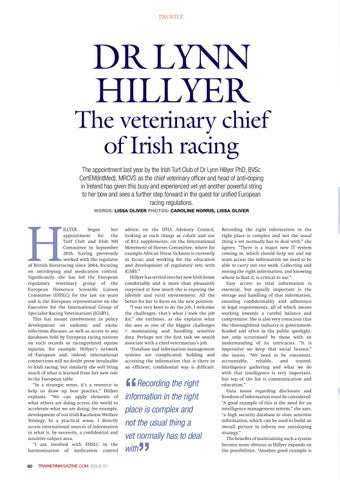PROFILE
DR LYNN HILLYER
The veterinary chief of Irish racing The appointment last year by the Irish Turf Club of Dr Lynn Hillyer PhD, BVSc CertEM(IntMed), MRCVS as the chief veterinary officer and head of anti-doping in Ireland has given this busy and experienced vet yet another powerful string to her bow and sees a further step forward in the quest for unified European racing regulations. WORDS: LISSA OLIVER PHOTOS: CAROLINE NORRIS, LISSA OLIVER
H
ILLYER began her appointment for the Turf Club and Irish NH Committee in September 2016, having previously worked with the regulator of British horseracing since 2004, focusing on anti-doping and medication control. Significantly, she has led the European regulatory veterinary group of the European Horserace Scientific Liaison Committee (EHSLC) for the last six years and is the European representative on the Executive for the International Group of Specialist Racing Veterinarians (IGSRV). This has meant involvement in policy development on endemic and exotic infectious diseases, as well as access to any databases held by European racing nations on such records as racing-related equine injuries, for example. Hillyer’s network of European and, indeed, international connections will no doubt prove invaluable to Irish racing, but similarly she will bring much of what is learned from her new role to the European table. “In a strategic sense, it’s a resource to help us draw up best practice,” Hillyer explains. “We can apply elements of what others are doing across the world to accelerate what we are doing; for example, development of our Irish Racehorse Welfare Strategy. In a practical sense, I directly access international sources of information in what is, by necessity, a confidential and sensitive subject area. “I am involved with EHSLC in the harmonisation of medication control
60
TRAINERMAGAZINE.COM ISSUE 57
EURO TRAINER ISSUE 57 HILLYER.indd 40
advice; on the IFHA Advisory Council, looking at such things as cobalt and use of B12 supplements; on the International Movement of Horses Committee, where for example African Horse Sickness is currently in focus; and working for the education and development of regulatory vets with IGSRV.” Hillyer has settled into her new Irish home comfortably and is more than pleasantly surprised at how much she is enjoying the lifestyle and rural environment. All the better for her to focus on the new position. “I was very keen to do the job, I welcome the challenges, that’s what I took the job for,” she enthuses, as she explains what she sees as one of the biggest challenges – maintaining and handling sensitive data. Perhaps not the first task we would associate with a chief veterinarian’s job. “Database and information management systems are complicated; holding and accessing the information that is there in an efficient, confidential way is difficult.
“
Recording the right information in the right place is complex and not the usual thing a vet normally has to deal with
”
Recording the right information in the right place is complex and not the usual thing a vet normally has to deal with,” she agrees. “There is a major new IT system coming in, which should help me and my team access the information we need to be able to carry out our work. Collecting and storing the right information, and knowing where to find it, is critical to me.” Easy access to vital information is essential, but equally important is the storage and handling of that information, ensuring confidentiality and adherence to legal requirements, all of which means working towards a careful balance and compromise. She is also very conscious that the thoroughbred industry is governmentfunded and often in the public spotlight, not only scrutinised by those with an understanding of its intricacies. “It is imperative we keep that social licence,” she insists. “We need to be consistent, accountable, reliable, and trusted. Intelligence gathering and what we do with that intelligence is very important, but top of the list is communication and education.” Data issues regarding disclosure and freedom of information must be considered. “A good example of this is the need for an intelligence management system,” she says, “a high security database to store sensitive information, which can be used to build an overall picture to inform our anti-doping strategy.” The benefits of maintaining such a system become more obvious as Hillyer expands on the possibilities. “Another good example is
31/03/2017 10:04
